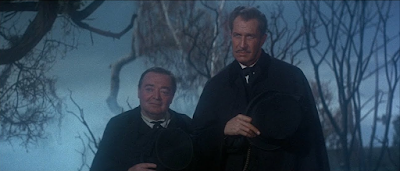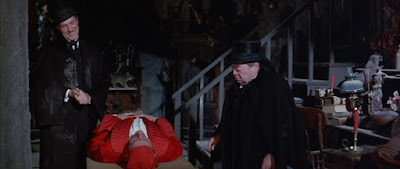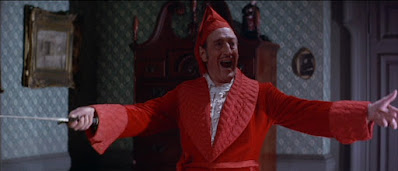1964
Directed by Jacques Tourneur
Written by Richard Matheson (based on his own imagination! wow!)
Roger Corman's series of Edgar Allan Poe adaptations had been big business for AIP throughout the early 1960s, and part of that, I'm sure, was simply their early experiment in the power of branding; part of it was their remarkably high level of quality. But I think another big part was that Corman, with AIP's backing, never let them go stale, so that by the fourth film, Tales of Terror (or even the third, Premature Burial), he began to mix up the formula significantly, finding a surprising variety of styles, tones, and genres within the basic material of Poe-attributed horror stories which, at least in Corman's retelling, almost uniformly revolved around crypts and graves, and the high likelihood that you might wind up in one even if you weren't dead yet. The reaction to Tales had suggested that one tone in particular, comedy, could be a winner. Audiences had acclaimed "The Black Cat" their favorite segment of Tales' anthology—mine's "Morella," but I wasn't around to fill out a feedback card requesting that they make even more movies where Vincent Price grieves a spouse—and it is down to this, I suspect, that Corman and AIP were so cheerfully accepting of screenwriter Richard Matheson's treatment of "The Raven," which reflects his exasperation over being assigned the poem inasmuch as it transforms Poe's most emotionally-immediate work into a zany romp about wizards. It turned out to be a successful calculation anyway: Corman's audience ate up The Raven, though it couldn't have hurt that, besides reteaming the stars of "The Black Cat," Price and Peter Lorre, The Raven also brought horror icon Boris Karloff into the AIP fold. The natural thing to do, then, would've been to make another Poe-themed horror-comedy with Price & Lorre, with the featured villainy of Karloff, directed by Corman and written by Matheson, and if they managed to bring back Joyce Jameson from "The Black Cat," that would be busty and swell, too. This was even the plan, whereupon Corman said "no, that's okay, thanks."
I can only speculate, but the only reason I can think of that the movie Matheson wrote for Corman, The Comedy of Terrors, was not branded with Poe's name and shoehorned into AIP's Poe Cycle is because Corman didn't direct it. Now, it's difficult to believe that AIP bosses James Nicholson and Sam Zarkoff were even capable of that level of respect and deference—these were the same guys who, when faced with the prospect of Corman doing a Poe picture independently with the financial backing of another company, bought out the other company—but it looks like respect and deference anyway, for while Comedy boasts of all the leading artists of the Corman Poes besides Corman himself—not just the screenwriter and stars, but production designer Daniel Haller, cinematographer Floyd Crosby, composer Les Baxter, editor Anthony Carras, and costume designer Marjorie Corso—they refrained from slapping the Poe name on it, which is downright bizarre considering that they did slap the name on Corman's H.P. Lovecraft adaptation, The Haunted Palace. Whatever their reasons, this wasn't a good calculation: Comedy underperformed, and it was also Matheson's last Gothic for AIP. Some blamed its soft box office on putting the word "comedy" in the title. I'd suggest that the problem lay more with "terror," as this was their third movie in three years with "terror" in the title, and the last one, The Terror, had been the movie studio equivalent of eating a turd on a dare. (It's a cute title nonetheless, and it's the only one with "terror" that isn't lazy.)
Now, Comedy of Terrors might not be based on any Poe—you could make a game of pretending to be an AIP executive and supplying your own Poe story or poem that "inspired" it; speaking for myself, it's easy to imagine Price reciting "The Conqueror Worm" over a montage here—but even without being based on Poe, it's absolutely based on Corman's Poes, Matheson having written it as, essentially, self-parody. This keeps it in line with his scripts for "The Black Cat" and The Raven, but even as part of a series that thrived by perpetually mixing up its approach, it's remarkable that even its comedies wound up distinct from one another. They're all excellent at being comedies, but while "The Black Cat" maintains a sharp horrific edge, and The Raven somehow became a quippy hang-out movie, this one's the avowed farce.
It's also the one that takes aim most squarely at its own genre and, indeed, its own franchise, exploiting all of the well-worn tropes of the Corman Poes and redeploying them as the nasty gags they kind of always were. Maybe this is why Corman begged off: though his engagement with the franchise clearly ebbed and flowed, his fascination with the author had recently rejuvenated with the chance to do his dream Poe project—for as Comedy was being made without him, Corman was off in Britain (the better to geographically disconnect himself from AIP, one surmises), extracting the philosophical pomp of Poe, and supplying much of his own, for the next real AIP Poe movie, The Masque of the Red Death.
This Comedy, in any case, certainly isn't philosophical. That's almost instantly apparent, with an opening credits sequence that offers Rhubarb, a cat, with a title card as big as any of its human stars, and as he figures into the plot in no way whatsoever, I don't even really know why the movie has a cat—one might suppose it's a nod to "The Black Cat," though the trained cat they got was a very unscary pale orange—but I do know that the cat's hilarious, and when Comedy culminates its farce with a violent melee, Rhubarb running around underfoot whilst the battle's participants' legs dart in zig-zags across the frame, the cat is what makes that image laugh-out-loud funny.
Comedy of Terrors is probably never funnier than its very first joke, and while that could be a sin, it isn't when the first joke is this good. So we begin, as so many Gothic horrors do, in a New England graveyard drenched in the clammy atmosphere conjured by dry ice and a funereal tune. Here we find some poor clod getting buried by the local undertakers, Waldo Trumbull (Price) and Felix Gillie (Lorre), who wait until all the mourners have slowly made their way out of the cemetery before revealing themselves as full-on cartoons. That's when they dump their client into the open grave, sans box, and fill up the hole at 10X speed, thereby absconding with the pricey coffin that we learn is their only coffin, and which they've been using (and re-using) for over a decade with the same basic scam.
Trumbull needs to scam, however, because he's a massive drunk and his funeral business has been in a state of collapse for years, pretty much ever since he took it over from his ancient and comically-enfeebled father-in-law, Amos Hinchley (Karloff). Considering the loud and abusive tenor of his conversations with his long-suffering wife Amaryllis (Jameson), Trumbull's regretted his choice of profession and in-laws for roughly that long. Gillie, for his part, has been practically enslaved, kept in line by Trumbull's knowledge that Gillie is a fugitive; but Trumbull's control has frayed thanks to Gillie's unspoken infatuation with Amyrillis. Things could be better, clearly, but they get even worse thanks to Trumbull and Hinchley's landlord, John Black (whom Karloff was going to play, but the physical requirements of the role made it infeasible in light of Karloff's advancing years; he is more than ably replaced, however, by Basil Rathbone, returning from Tales of Terror and making this a real all-star affair). Black demands his year-late rent, and Trumbull has little choice but to make promises he can't keep—fortunately, he has some unconventional ideas about how to drum up a little bit of extra business.
I didn't notice it the first time I saw it, because it's not the kind of movie that would need to overenunciate its characters' immorality, but this isn't even the first time that Trumbull's seen fit to forcibly expand the market for his funeral services; and it probably goes without saying that Trumbull eventually realizes that he can check two boxes at once if he turns his attentions to Mr. Black. This is some truly macabre stuff, maybe all the moreso because the film only seems to find it all sickly amusing, not damnable. This is especially true of the murder, and especially the attempts on Black, who of course suffers from the commonplace malady of Corman Poe characters, catalepsy, and who resolutely refuses to stay in his coffin no matter how many times they conk him on the head. But it's also true of everything else: domestic abuse; employee abuse by a very tall man towards a very short one; there's at least the intimation of a sexual assault joke (effected by Price, so it's more in a "oh my, there's a half-naked lady (Beverly Hills) in this bedroom, oh my" register, though he is here to snuff her dad in his bed); and of course Trumbull's frequent offer to Amyrillis to give her father his "medicine." To give you further idea of the plane on which the film operates, it's in a bottle marked, with big capital letters, "POISON."
It's mean-spirited; it's reprehensible; it's scarcely believable for even one second; obviously, it's fantastic. It's a jam-packed ensemble of antipathetic scum—even Karloff and Jameson's characters are defined by being useless and, in Amyrillis's case, narcissistic and irritating. (Amyrillis is convinced that her screechy caterwauling could have landed her a career in opera if only she hadn't thrown her life away by marrying Trumbull, but she sings so unbearably badly that Jameson plainly has to make an effort to be that tone-deaf--after her first scene, she must've been taken aside and told she had to sing worse. That's a running gag all by itself, but Amaryllis's singing is also Comedy's vector for impossible physics, Amaryllis's shrill voice making glasses explode, flowers wilt, and top hats fly off her Victorian husband's head.)
Above all, there's the rotten heart of the film in Price, who makes fine dining out of one of the basest and ugliest characters he ever played, not exactly getting you in his corner, exactly, but compelling you to see how many negative traits he can pack into one performance—sociopathy, cowardice, lechery, dissolution, hypocrisy, and so much more. (My favorite flourish is the way light suddenly bathes his face in a beatific glow as he asks the heavens, "Is there no morality left in the world?", after his murder victim's heir's welched on her bill.) Matheson's script is the key: though House of Usher and Pit and the Pendulum had human dimensions that Price was able to mine for genuine feeling, it's hard not to call Comedy the best screenplay that Matheson wrote for AIP's Gothic horrors. The Poe adaptations had always required a certain overripeness, but this allowed him to stretch that much further, with the kind of florid, thesaurus-driven verbiage that could only ever have been accommodated by a comedy, especially the kind of comedy where even the smartest-sounding character is, in fact, dumb as fuck. The whole cast works wonders with Matheson's dialogue—Price and Jameson's ability to scream it at each other at top volume while maintaining their mutual cruelties in the realm of vaudeville is maybe the standout example of "this could be blood-curdling, but it's actually hilarious"—and that's just breakfast at the Trumbull house, not the extreme situations and the physical comedy that a film that opens with fast-forward corpse-desecration promises. (Not that it always integrates them seamlessly: the only scary thing in this "horror"-comedy arises out of Lorre's real-life physical frailty—sadly, we won't be seeing him again in this retrospective, and I imagine you know why—and this comes into play whenever his stunt-double is onscreen. They've put him in a mail-order Peter Lorre mask that they don't go out of their way to hide, and it triggers a visceral level of uncanny disgust whenever Gillie does anything much more taxing than sitting down.)
Corman's unavailability hadn't been a problem: Matheson had just the replacement in mind, and prevailed upon his producer, Carras (making this the rare film with a producer-editor, so it makes you wonder how the final cut went), to hire Jacques Tourneur, known then and known now as the most celebrated horror filmmaker of the 1940s. Tourneur somewhat deserves that reputation: he'd made great horror movies (Cat People), solid melodramas that pretended to be horror movies (I Walked With a Zombie), and horror movies that people occasionally say are great because he made Cat People, even if all they had was an interesting idea poorly-executed (The Curse of the Demon). His career had hit a skid about a good decade prior, hence his latterday association with AIP, which was still a vertical move from doing television; he had near-zero experience with comedy. You would never be able to tell from this. If it weren't an anachronistic comparison, you could describe it as feeling like Mel Brooks—that weird alchemy of Brooks at his best, where it would feel like a "real" movie, with real stakes, despite having no more actual substance than a pack of caricatures doing funny sketches.
Perhaps that's because Comedy feels so fully of a piece with Corman's own Gothic sensibility (hell, even moreso than The Raven had), especially in Crosby's cool, stark photography and Haller's design; with its foggy soundstage New Englishness, it winds up with an aesthetic almost identical to Premature Burial. (Baxter's score is also a friend to the laughs, sometimes as an ironic counterpoint, sometimes just as garish accompaniment; and when he does give in to his worst nudge-you-in-the-ribs impulses, it always feels more appropriate here than it did in The Raven.) There's a lot of silly visual invention from Tourneur to go along with the silly performances, but I think the real secret is Tourneur and Carras's deft editing—underlining that the difference between comedy and "horror" is sometimes just the level of bounciness you apply to the imagery. Though insert shots of cats gulping in fear helps.
That I've felt the urge to put "horror" in scare-quotes twice may suggest how Comedy gets knocked down a notch: it's not that I want it to be frightening, because that's not its goal; but when the film's whole attitude has exclusively been that of fascinated repulsion, it deflates things a bit when somebody, maybe Matheson, maybe not, decided that it needed to have a happy ending. (It was my first impulse to put that in scare-quotes too, but that would wrongly imply there's even any sarcasm to it.) Arguably, the happiest thing for everybody would be if they all died; but whatever else, the body count of a murder comedy should probably be slightly higher than two, especially when it feints towards a massacre and doesn't give you one. (On my second watch, I was readier to meet it where it is; the fact that these people keep getting up is, itself, a gag.) Of course, when I say it's been "knocked down," all that means is that it's only not unambiguously my favorite of the Corman Poes. Which is a hell of a feat anyway for a movie that isn't Corman or Poe.
Score: 9/10






No comments:
Post a Comment